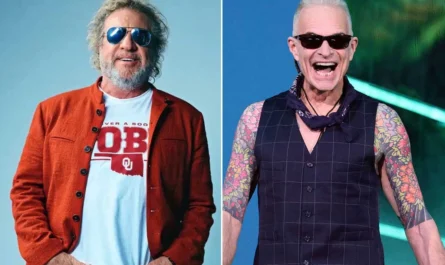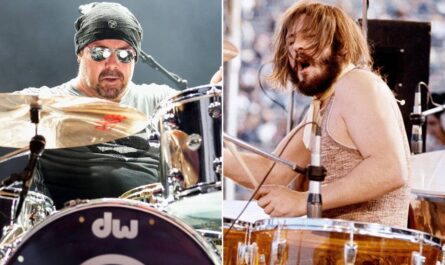Fred Durst has shared an emotional tribute following the passing of Limp Bizkit bassist Sam Rivers. He reflected on their decades-long partnership and the formation of the iconic band. The heartfelt statement was posted on Instagram.
In his tribute, Durst recounted the story of how he first discovered Rivers. He explained how their meeting became the foundation of Limp Bizkit.
“How I met Sam is I put a couple of iterations of an idea of a band I was trying to make happen in Jacksonville, Florida. I had this idea and vision for this particular type of style and sound, and I just couldn’t get it together right. And so I decided, ‘I’m gonna go out and find the right players to do this and bring this thing together.’ And I’d gone into this little tiny bar/pub where this band was playing at Jax Beach called Pier 7. And there Sam was on the stage with his band, killing it on the bass. And I went, ‘Oh my gosh, this guy’s amazing,’” Durst said.
“In my mind, you had to start with the rhythm section, the bass and the drums. And I didn’t know who I was gonna meet first to put this idea together — I didn’t know if it’d be the drummer or the bass player — but it was the bass player. I saw Sam play and I was blown away. He was playing a five-string bass too. I’d never really seen someone using a five-string bass. And he was so smooth and good and he stood out, and I could hear nothing else but Sam. Everything disappeared besides his gift. And I went up to Sam after the show and I said, ‘Hey, man, you’re unbelievable. I got this idea for this band I wanna do’ and kind of threw it out there and told him what I wanted it to be. And he looked at me and he says, ‘Killer. I’m in. Let’s do it.’ I was, like, ‘Oh my God. Well, let’s do it.’ And uh, you know, that’s kind of how things started to come together. I had a bass player.”
Durst praised Rivers’s exceptional musical talent and their shared passion for grunge music. This became a cornerstone of Limp Bizkit’s sound.
“Sam had this thing about him where anything I could spit out of my mouth — ‘try this’, ‘try this’, ‘do this’ or ‘this’ — Sam could do it and do it a thousand times better than I could hear it in my head. And also Sam and I shared an affinity, a love for grunge music. That’s something that we were both really on the same page about. Sam really loved Mother Love Bone and Alice In Chains and Stone Temple Pilots and the whole Seattle grunge movement,” he continued.
“And he had this kind of ability to pull this beautiful sadness out of the bass that I’d never heard. I mean, he would play chords. He was just so talented. I can’t explain it. I know I’m all over the place here. Just thinking about him, it’s so tragic that he’s not here right now. And I’ve gone through gallons and gallons of tears since yesterday, and I’m thinking, ‘My god, Sam’s a legend.’ He did it. He lived it.”
The frontman reflected on their journey together and Rivers’s recent happiness with the band’s success.
“With Limp Bizkit, we’ve just been on such a journey. It’s been a massive rollercoaster. Here we are just having this incredible moment, man, and it’s going so, so beautifully smooth. And Sam was just really, really happy about it. We’ve rocked stadiums together, been around the world together, shared so many moments together. And I know that wherever Sam is right now, he’s smiling and feeling, like, ‘Man, I did it. I did it.’ And man, did he do it. What he’s left us behind is priceless. He was such a special person. And Sam was a very private person too. So the few people that were able to be close with him and around him know what I’m saying to be true,” Durst said.
“He was a very, very special, genuine person. And when he got on that stage, just that Sam-I-Am, that Sam Rivers came out and he was a beast. [He was] just an amazing, amazing person. And when I think back to how I met him and how all this kind of came together, Sam was the first guy that really came in and helped make this dream come true. And he didn’t think twice about it. He was just, like, ‘Yeah, let’s go. Sounds great to me. Let’s do it.’ And I was 25 years old and he was 18 years old and young and just had all that fire in him and all that talent. And I just knew that I was very, very, very fortunate, very fortunate to have him in my life.”
Durst concluded his tribute by expressing his gratitude for their time together. He acknowledged the outpouring of support from fans worldwide.
“And I’m so grateful, so incredibly grateful to have shared part of this journey with Sam Rivers — a huge part of this journey, a huge part of my journey. I’m super, super grateful and I miss him terribly already. And all the support and love out there I’ve seen online, it’s overwhelming. He really did have an impact on the world, and his music and his gift is the one that’s gonna keep on giving. And I just love him so much,” he said.
Rivers’s passing marks the loss of a pivotal figure in the nu metal movement that defined a generation of rock music.
Rivers was a bassist and backing vocalist for Limp Bizkit. He was an integral part of the group’s sound and identity. Wikipedia noted that he contributed to their unique blend of nu metal, hip hop, and alternative rock that propelled the band to international fame.
Limp Bizkit rose to prominence in the late 1990s and early 2000s with chart-topping hits like “Rollin’,” “Nookie,” and “Break Stuff.” Rivers’s bass work provided the foundation for these iconic tracks. It helped to establish the band as one of the most successful acts of the nu metal era. His technical proficiency on the five-string bass, as Durst noted in his tribute, set him apart from many of his contemporaries.
Rivers played a significant role in shaping the nu metal genre during its peak years. His work with Limp Bizkit influenced countless other artists and helped define the sound that dominated rock radio and MTV in the early 2000s. The band’s aggressive yet melodic approach, anchored by Rivers’s bass lines, became a blueprint for many acts that followed.
Rivers’s contributions to music remain celebrated by fans worldwide despite his passing. His legacy lives on through the extensive catalog of music he created with Limp Bizkit. This catalog continues to resonate with both longtime fans and new listeners discovering the band’s influential body of work.





